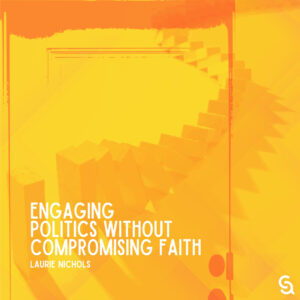 I must admit, when I consider the current political climate, a sense of unease settles within me. And I know for a fact that I am not alone. Rarely in recent memory have more people wanted to talk about their deep fears and worries after a transition of power in the Oval Office. The landscape is also fraught with deep divisions, heated debates, and a cacophony of voices clamoring for attention. One day in the news these days feels like a hundred.
I must admit, when I consider the current political climate, a sense of unease settles within me. And I know for a fact that I am not alone. Rarely in recent memory have more people wanted to talk about their deep fears and worries after a transition of power in the Oval Office. The landscape is also fraught with deep divisions, heated debates, and a cacophony of voices clamoring for attention. One day in the news these days feels like a hundred.
So here I am: Feeling overwhelmed and questioning how, as a follower of Christ, I can navigate this complex terrain without compromising my faith.
The issues at hand are multifaceted, encompassing matters of justice, morality, and societal well-being. They often seem insurmountable, leading to a temptation to retreat into the comfort of like-minded communities or to disengage altogether. Neither of these will do in our day.
The call of the gospel compels me otherwise. Jesus’ command to love God with all my heart, soul, mind, and strength, and to love my neighbor as myself, does not come with exceptions for political discomfort. In fact, it challenges me to engage more deeply, to seek the welfare of our communities and nation (see Jeremiah 29:7), and to act justly, love mercy, and walk humbly with my God (Micah 6:8).
Theologian Miroslav Volf argues that faith cannot be separated from public life. In A Public Faith: How Followers of Christ Should Serve the Common Good, he critiques two prevalent approaches: the exclusion of religion from public spheres and the saturation of public life with a single religion. Instead, he calls for a middle way, where faith engages the public sphere constructively rather than withdrawing or seeking dominance. Volf states, “For Christians, faith is a precious good, the most valuable personal and social resource. When it is left untapped, the common good suffers.”
His insights challenge me to rethink the role of my faith in public engagement. If I am truly committed to following Christ, then I cannot ignore the political realities that shape the lives of my neighbors. But how do I, as a Christian, engage in politics in a way that reflects Christ’s love and truth? How do I avoid the pitfalls of partisanship and instead promote a kingdom-first perspective?
First, I must confess this is really, really hard. Then, I must recognize that meaningful engagement requires more than passive interest. It demands a commitment to understanding the issues, a willingness to listen to differing perspectives, and the courage to stand for justice and righteousness, even when it’s unpopular. On a recent episode of “French Fridays” on the Holy Post podcast, David French and Skye Jethani discussed how there is simply no other way to move forward than with courage.
That said, here I want to suggest four postures that can help us have a framework for engaging politically as faithful Christians.
The posture of humble discernment
In a world inundated with information, it’s easy to become entrenched in our viewpoints, dismissing opposing perspectives. However, Scripture encourages a different approach. Romans 12:2 advises, “Do not conform to the pattern of this world, but be transformed by the renewing of your mind. Then you will be able to test and approve what God’s will is—his good, pleasing, and perfect will.” This transformation involves seeking God’s guidance to discern truth amidst noise.
Dietrich Bonhoeffer, a theologian who was killed by the Nazi regime in Germany, exemplified humble discernment. While many church leaders capitulated to the regime, Bonhoeffer critically evaluated the political climate through the lens of his faith, ultimately resisting the corrupt system. He emphasized active opposition to injustice, stating, “We are not to simply bandage the wounds of victims beneath the wheels of injustice; we are to drive a spoke into the wheel itself.”
Action Steps:
- Seek diverse perspectives: Engage with media and literature that challenge your viewpoints. This broadens understanding and fosters empathy.
- Practice active listening: In discussions with those who think differently, prioritize understanding over responding. This approach can transform debates into meaningful dialogues.
The posture of pursuing justice and truth
Our faith calls us to champion justice, especially for the marginalized. Micah 6:8 reminds us to “act justly, love mercy, and walk humbly with your God.” This means our political engagement should transcend party lines, focusing instead on the principles of justice and truth.
Dorothy Day, founder of the Catholic Worker Movement, dedicated her life to advocating for the poor and workers’ rights. She didn’t align strictly with any political party but remained steadfast in her commitment to the gospel’s call for justice. This commitment manifested in the establishment of “houses of hospitality,” which provided shelter and aid to those in need, and the publication of The Catholic Worker newspaper, which addressed social issues from a faith-based perspective.
Action Steps:
- Evaluate policies over parties: Assess political positions based on their alignment with biblical justice rather than party affiliation.
- Advocate for the vulnerable: Support initiatives and policies that protect and uplift marginalized communities.
The posture of civility and peacemaking
In an era where political discourse is often marked by hostility, embodying civility becomes a radical act. Jesus proclaimed, “Blessed are the peacemakers, for they will be called children of God” (Matthew 5:9). Embracing this beatitude means striving for reconciliation and understanding, even amidst deep disagreements.
Rev. Martin Luther King Jr. championed civil rights through nonviolent means. He emphasized love and understanding, even when confronted with hatred, embodying the essence of peacemaking. King believed that, “Nonviolence is a powerful and just weapon which cuts without wounding and ennobles the man who wields it. It is a sword that heals.” He also highlighted the transformative power of love, asserting, “Darkness cannot drive out darkness: only light can do that. Hate cannot drive out hate: Only love can do that.”
Action Steps:
- Engage respectfully: Avoid name-calling or dehumanizing language, even when discussing contentious issues.
- Foster constructive dialogue: Create spaces where individuals can share their perspectives without fear of judgment.
The posture of ultimate allegiance to Christ
While political systems play a significant role in society, our ultimate loyalty must reside with Christ. Philippians 3:20 reminds us, “Our citizenship is in heaven, and we eagerly await a Savior from there, the Lord Jesus Christ.” This perspective helps us navigate political involvement without losing sight of our primary commitment.
Early Christians often found themselves at odds with Roman authorities, because their allegiance to Christ superseded their loyalty to the empire. This unwavering commitment laid the foundation for a faith that has endured for millennia. A powerful biblical quote that reflects the early Christians’ commitment to Christ over earthly authorities is found in Acts 5:29, when Peter and the apostles boldly declare: “We must obey God rather than human beings!”
Action Steps:
- Regular reflection: Periodically assess whether your political engagements align with your faith commitments.
- Community accountability: Surround yourself with fellow believers who can provide guidance and correction when political loyalties threaten to overshadow spiritual ones.
By adopting these postures, we can engage in the political sphere thoughtfully and faithfully, ensuring that our actions reflect our devotion to Christ above all else. In doing so, we become beacons of grace and truth in a polarized world. I am committed to trying to do this. Will you join me?
CSA resources to help you foster constructive dialogue:
- Moving from Deadlock to Dialogue by Rob Barrett
- The Call to Dialogue by Kristyn Komarnicki
- Three Scriptural Ways to Navigate Conflict Nonviolently by Alex Haskins
- 20 Minute Takes: Kristyn Komarnicki & Transforming Conflict Episode with Nikki Toyama-Szeto and Kristyn Komarnicki

Laurie Nichols has been working in communications and marketing for 25 years, helping organizations and individuals craft compelling narratives and communications strategies. She is the founder of Common Good Communications, a consulting firm dedicated to bringing good ideas to life through effective messaging and strategy. Laurie has a BA in journalism and communications (Valparaiso University) and an MA in interdisciplinary studies (Wheaton College). Laurie also writes the Finding Faith Again blog, where she helps those who are far or near to God take one step closer.


